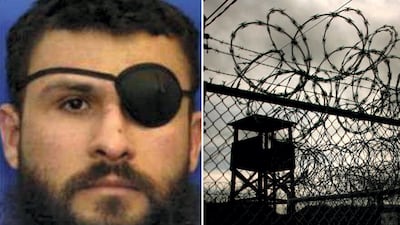The UK government is trying to stop a Guantanamo Bay prisoner suing over claims its security services were complicit in his torture at CIA “black sites”.
Zayn Al-Abidin Muhammad Husayn, a Saudi-born Palestinian and suspected senior Osama bin Laden lieutenant, better known as Abu Zubaydah, alleges the British security services passed questions to the Americans during interrogations in which he was waterboarded 83 times at the sites in six countries.
Abu Zubaydah was the first high-profile Al Qaeda suspect to be captured after the September 11 attacks and has been held since then without trial.
His lawyers are suing for false imprisonment, negligence and misfeasance in public office. They highlight a US Senate report that said he suffered “serious injuries and permanent physical disability” as a result of torture so severe even CIA officers were left “profoundly distressed”.
But the government is arguing UK law is not applicable in the case and that any claim should be brought in the countries where the alleged torture took place.
It initially won its argument but that was overturned on appeal and ministers have now gone to the Supreme Court in a bid to have the claim thrown out.
The government's lawyer Sir James Eadie KC said at the start of the hearing that Abu Zubaydah has never set foot in the UK, nor does he claim that British intelligence services directly harmed him.
He told the court the UK could not be liable as his personal injuries “were not caused by the posing of questions” and all the “critical conduct” was carried out by the CIA.
In his submission to the Supreme Court, Abu Zubaydah’s lawyer said if the UK government was successful it would lead to an “outcome which is unprincipled, unworkable and absurd”.
The liability of the government for human rights abuses in “secret extra-legal prisons abroad” on behalf of the UK would be determined not in Britain but by the laws “of an array” or foreign countries, he said. Neither the victim nor those alleged to be complicit in the abuses would have any “meaningful connection” with these countries.

Between 2002 and 2006 he was flown to Thailand, Poland, Morocco, Lithuania and Afghanistan for interrogation before being taken back to Guantanamo Bay in 2006, where he has since been held, the Supreme Court heard.
He has been reportedly been subjected to protracted confinement inside tiny boxes, including one resembling a coffin.
His ordeal in captivity became the blueprint for brutal US treatment and during the waterboarding, Abu Zubaydah became “completely unresponsive, with bubbles rising through his open, full mouth”, according to the US Senate intelligence report.
Former president George W Bush claimed in 2006 that information provided by Abu Zubaydah under the CIA’s programme of “enhanced interrogation” led to the capture of Ramzi Bin Al Shibh, a Yemeni accused of being a key facilitator of the September 11 attacks.
The former president further claimed that the pair provided information that helped in the capture of 9/11 mastermind Khalid Sheikh Mohammed.
But other claims that Abu Zubaydah made while in custody have been found to be false.
British police started an investigation in 2019 into the alleged complicity of security and intelligence officials from MI5 and MI6.
The UK’s all-party parliamentary intelligence and security committee concluded in 2018 after a four-year inquiry that MI6 knew about his extreme mistreatment and possible torture.


